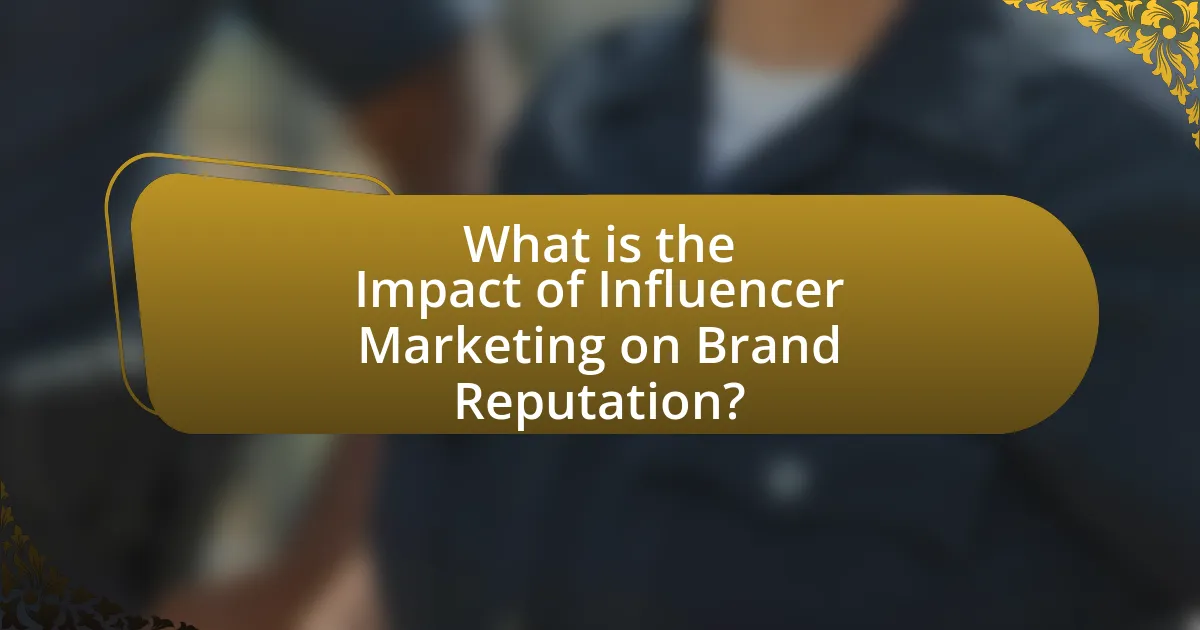The article examines the impact of influencer marketing on brand reputation, highlighting how brands can enhance their image through strategic partnerships with credible influencers. It discusses the psychological factors that contribute to the effectiveness of influencer marketing, such as trust and relatability, and outlines the potential risks, including reputational damage and lack of authenticity. Best practices for monitoring influencer marketing effectiveness are presented, including the use of key performance indicators and sentiment analysis. Additionally, the article emphasizes the importance of transparency and compliance with advertising regulations to maintain consumer trust and brand integrity.

What is the Impact of Influencer Marketing on Brand Reputation?
Influencer marketing significantly enhances brand reputation by leveraging the trust and credibility that influencers have with their audiences. Brands that collaborate with well-aligned influencers can experience increased brand awareness, positive brand associations, and improved consumer perceptions. For instance, a study by the Digital Marketing Institute found that 49% of consumers depend on influencer recommendations, indicating a strong correlation between influencer endorsements and consumer trust. Furthermore, brands that engage in influencer marketing often see a boost in social media engagement, which can lead to a more favorable public image and increased customer loyalty.
How does influencer marketing influence consumer perceptions of brands?
Influencer marketing significantly shapes consumer perceptions of brands by leveraging the credibility and relatability of influencers to enhance brand trust and awareness. When consumers see influencers they admire endorsing a brand, they often perceive that brand as more trustworthy and relevant, leading to increased likelihood of purchase. Research indicates that 49% of consumers depend on influencer recommendations for their purchasing decisions, highlighting the effectiveness of this marketing strategy in altering brand perception. Additionally, influencers can create authentic narratives around products, which resonate with their audience, further solidifying positive brand associations.
What psychological factors contribute to the effectiveness of influencer marketing?
The psychological factors that contribute to the effectiveness of influencer marketing include social proof, trust, and relatability. Social proof occurs when consumers observe others endorsing a product, leading them to believe that the product is valuable; studies show that 79% of consumers trust online reviews as much as personal recommendations. Trust is established through the perceived authenticity of influencers, as 61% of consumers feel more connected to brands when they engage with influencers they trust. Relatability enhances engagement, as audiences are more likely to connect with influencers who share similar values or lifestyles, resulting in a 50% higher engagement rate compared to traditional advertising. These factors collectively enhance the persuasive power of influencer marketing, driving consumer behavior and brand loyalty.
How do influencers shape brand narratives and consumer trust?
Influencers shape brand narratives and consumer trust by leveraging their authenticity and relatability to create compelling stories around products and services. Their personal experiences and endorsements resonate with audiences, making brands appear more credible. Research indicates that 70% of teenagers trust influencers more than traditional celebrities, highlighting the effectiveness of influencer marketing in building trust. Additionally, influencers often engage with their followers through interactive content, fostering a sense of community and loyalty, which further enhances consumer trust in the brand they represent.
What are the potential risks associated with influencer marketing?
The potential risks associated with influencer marketing include reputational damage, lack of authenticity, and regulatory compliance issues. Reputational damage can occur if an influencer engages in controversial behavior or promotes products that do not align with their audience’s values, leading to negative perceptions of the brand. Lack of authenticity arises when influencers promote products insincerely, which can result in audience distrust and decreased engagement. Regulatory compliance issues may arise from failing to disclose paid partnerships, as mandated by the Federal Trade Commission, which can lead to legal repercussions and further harm to brand reputation.
How can negative influencer behavior affect brand reputation?
Negative influencer behavior can significantly harm brand reputation by eroding consumer trust and damaging brand image. When influencers engage in controversial or unethical actions, their followers may associate these behaviors with the brands they promote, leading to negative perceptions. For instance, a study by the University of Southern California found that 60% of consumers are less likely to purchase from a brand if they perceive its influencer as untrustworthy. This association can result in decreased sales, loss of customer loyalty, and long-term reputational damage for the brand.
What role does authenticity play in mitigating risks?
Authenticity plays a crucial role in mitigating risks by fostering trust between brands and consumers. When brands engage in influencer marketing with authentic representatives, they reduce the likelihood of backlash from consumers who may perceive inauthenticity as deceptive. Research indicates that 86% of consumers consider authenticity important when deciding which brands to support, highlighting that genuine endorsements can lead to stronger brand loyalty and reduced reputational risks. By prioritizing authenticity, brands can effectively navigate potential pitfalls associated with influencer partnerships, ensuring that their messaging aligns with consumer expectations and values.

What are the Best Practices for Monitoring Influencer Marketing?
The best practices for monitoring influencer marketing include setting clear objectives, tracking engagement metrics, analyzing audience sentiment, and ensuring compliance with regulations. Clear objectives help define what success looks like, while tracking metrics such as likes, shares, and comments provides quantitative data on performance. Analyzing audience sentiment through comments and feedback reveals how the audience perceives the brand and influencer collaboration. Compliance monitoring ensures that influencers adhere to advertising standards, which is crucial for maintaining brand reputation. According to a study by the Digital Marketing Institute, 70% of marketers believe that measuring influencer marketing effectiveness is essential for optimizing campaigns.
How can brands effectively track influencer performance?
Brands can effectively track influencer performance by utilizing key performance indicators (KPIs) such as engagement rates, reach, and conversion metrics. Engagement rates, which include likes, comments, and shares, provide insight into how well the influencer’s audience interacts with the content. Reach measures the total number of unique users who see the content, indicating the potential audience size. Conversion metrics, such as click-through rates and sales generated from influencer campaigns, directly assess the impact on brand revenue. According to a study by Influencer Marketing Hub, 63% of marketers believe that measuring ROI is crucial for influencer marketing success, highlighting the importance of these metrics in evaluating performance.
What metrics should brands focus on when evaluating influencer campaigns?
Brands should focus on engagement rate, reach, impressions, conversion rate, and return on investment (ROI) when evaluating influencer campaigns. Engagement rate measures the level of interaction (likes, comments, shares) relative to the audience size, indicating how well the content resonates with followers. Reach quantifies the total number of unique users who see the content, while impressions track the total views, providing insight into visibility. Conversion rate assesses the effectiveness of the campaign in driving desired actions, such as purchases or sign-ups. Lastly, ROI evaluates the financial return generated from the campaign relative to its cost, helping brands determine overall effectiveness. These metrics collectively provide a comprehensive view of an influencer campaign’s impact on brand reputation and performance.
How can sentiment analysis be utilized in monitoring brand reputation?
Sentiment analysis can be utilized in monitoring brand reputation by systematically evaluating consumer opinions expressed in online content. This technique involves analyzing social media posts, reviews, and comments to determine the overall sentiment—positive, negative, or neutral—toward a brand. For instance, a study by Kumar et al. (2020) in the Journal of Business Research found that brands with a higher percentage of positive sentiment in consumer feedback experienced a 20% increase in customer loyalty. By continuously tracking sentiment trends, brands can identify potential issues, gauge public perception, and adjust their marketing strategies accordingly, thereby maintaining a favorable reputation.
What tools and technologies are available for monitoring influencer marketing?
Tools and technologies available for monitoring influencer marketing include social media analytics platforms, influencer marketing software, and brand monitoring tools. Social media analytics platforms like Hootsuite and Sprout Social provide insights into engagement metrics and audience demographics, enabling brands to assess influencer performance. Influencer marketing software such as AspireIQ and Traackr facilitate the identification and management of influencers, tracking campaign effectiveness through metrics like reach and ROI. Brand monitoring tools like Mention and Brandwatch allow companies to track brand mentions and sentiment across various channels, providing a comprehensive view of influencer impact on brand reputation. These tools collectively enhance the ability to measure and optimize influencer marketing strategies effectively.
Which social media analytics platforms are most effective?
The most effective social media analytics platforms include Hootsuite, Sprout Social, and Google Analytics. Hootsuite offers comprehensive social media management and analytics tools, allowing users to track engagement metrics across multiple platforms. Sprout Social provides in-depth reporting features and audience insights, which are crucial for understanding brand reputation. Google Analytics, while primarily a web analytics tool, integrates social media data to measure the impact of social campaigns on website traffic and conversions. These platforms are widely recognized for their ability to deliver actionable insights, supported by user reviews and industry reports highlighting their effectiveness in monitoring brand performance and influencer marketing outcomes.
How can brands leverage AI and machine learning in monitoring efforts?
Brands can leverage AI and machine learning in monitoring efforts by utilizing advanced algorithms to analyze vast amounts of data from social media, customer feedback, and online reviews in real-time. This technology enables brands to identify trends, sentiment, and potential issues related to their reputation quickly and accurately. For instance, a study by McKinsey & Company found that companies using AI for customer insights can improve their marketing effectiveness by up to 15%. By implementing machine learning models, brands can automate the detection of negative sentiment and emerging crises, allowing for timely responses that protect their reputation.

How can Brands Enhance Their Reputation through Influencer Marketing?
Brands can enhance their reputation through influencer marketing by strategically partnering with credible influencers who align with their values and target audience. This alignment fosters authenticity, as consumers are more likely to trust recommendations from influencers they admire. For instance, a study by the Digital Marketing Institute found that 49% of consumers depend on influencer recommendations when making purchase decisions, highlighting the effectiveness of influencer credibility in shaping brand perception. Additionally, brands can leverage influencers to create engaging content that resonates with their audience, further solidifying their reputation. By consistently monitoring and analyzing the impact of these collaborations, brands can adapt their strategies to maintain a positive image and build long-term trust with consumers.
What strategies can brands implement to build positive relationships with influencers?
Brands can build positive relationships with influencers by fostering open communication and mutual respect. Establishing clear expectations and providing creative freedom allows influencers to authentically represent the brand, which enhances credibility. Research indicates that 61% of consumers trust influencer recommendations, highlighting the importance of genuine partnerships. Additionally, brands should engage in long-term collaborations rather than one-off campaigns, as sustained relationships lead to deeper trust and loyalty. According to a study by the Digital Marketing Institute, 70% of marketers believe that long-term influencer partnerships yield better results. By prioritizing these strategies, brands can effectively strengthen their connections with influencers, ultimately benefiting their reputation.
How can collaboration with influencers align with brand values?
Collaboration with influencers can align with brand values by ensuring that the influencer’s personal beliefs and audience resonate with the brand’s mission and ethics. When brands partner with influencers who authentically embody their values, it enhances credibility and fosters trust among consumers. For instance, a sustainable fashion brand collaborating with eco-conscious influencers can effectively communicate its commitment to environmental responsibility, thereby reinforcing its brand identity. Research indicates that 70% of consumers are more likely to purchase from brands that align with their personal values, highlighting the importance of this alignment in influencer marketing strategies.
What role does transparency play in influencer partnerships?
Transparency is crucial in influencer partnerships as it fosters trust between brands, influencers, and their audiences. When influencers disclose paid partnerships or sponsorships, it enhances credibility and aligns with regulatory guidelines, such as the Federal Trade Commission’s endorsement guidelines. Research indicates that 61% of consumers are more likely to trust influencers who are transparent about their relationships with brands, which can positively impact brand reputation and consumer loyalty.
What are the common pitfalls brands should avoid in influencer marketing?
Brands should avoid several common pitfalls in influencer marketing to protect their reputation. One major pitfall is partnering with influencers whose values do not align with the brand, which can lead to audience backlash; for instance, a study by the Digital Marketing Institute found that 60% of consumers are less likely to purchase from brands that collaborate with influencers who have controversial reputations. Another pitfall is failing to disclose paid partnerships, as transparency is crucial; the Federal Trade Commission mandates that influencers must clearly disclose sponsored content, and non-compliance can result in legal repercussions. Additionally, brands should avoid over-reliance on influencer metrics like follower count without assessing engagement quality, as high follower counts do not guarantee effective reach; research by Influencer Marketing Hub indicates that engagement rates are a more reliable indicator of an influencer’s impact. Lastly, neglecting to monitor campaign performance can lead to wasted resources; brands should utilize analytics tools to track the effectiveness of their influencer partnerships and adjust strategies accordingly.
How can brands ensure compliance with advertising regulations?
Brands can ensure compliance with advertising regulations by implementing a robust compliance program that includes regular training, clear guidelines, and monitoring of advertising content. This program should be informed by the specific regulations applicable to their industry, such as the Federal Trade Commission (FTC) guidelines in the United States, which require transparency in influencer partnerships. Regular audits of marketing materials and influencer communications can help identify potential compliance issues before they escalate. Additionally, brands should maintain open communication with legal counsel to stay updated on any changes in advertising laws and regulations, ensuring that all promotional activities align with current standards.
What are the consequences of failing to disclose paid partnerships?
Failing to disclose paid partnerships can lead to legal repercussions, loss of consumer trust, and damage to brand reputation. Regulatory bodies, such as the Federal Trade Commission (FTC) in the United States, impose fines and penalties for non-compliance with disclosure guidelines, which can amount to thousands of dollars. Additionally, consumers may feel deceived if they discover that content was sponsored without proper disclosure, leading to a decline in engagement and loyalty. Research indicates that transparency in influencer marketing enhances credibility, while lack of disclosure can result in negative sentiment towards both the influencer and the brand involved.
What practical tips can brands follow for successful influencer marketing?
Brands can achieve successful influencer marketing by selecting influencers whose values align with their brand and audience. This alignment ensures authenticity, which is crucial for building trust with consumers. Research indicates that 92% of consumers trust recommendations from individuals over brands, highlighting the importance of genuine partnerships. Additionally, brands should establish clear objectives and metrics for their campaigns, such as engagement rates and conversion tracking, to measure effectiveness. According to a study by the Digital Marketing Institute, campaigns with defined goals are 376% more likely to succeed. Furthermore, maintaining open communication with influencers fosters collaboration and creativity, leading to more impactful content. Brands should also consider diversifying their influencer partnerships across various platforms to reach a broader audience, as different demographics engage with different social media channels.

Leave a Reply